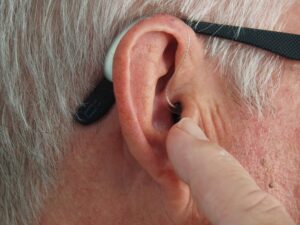Earwax Build-up And Blockages – Some Common Issues
Earwax Blockages: Earwax melancholy is quite frequent. Age makes earwax harder and less moveable.
Excess earwax is more common in the elderly. It can cause symptoms, including hearing loss. It may also hinder a complete ear examination.
You may get earwax removal drops over the counter. They include acetic acid, hydrogen peroxide, or sodium bicarbonate. Oils lubricate and soften earwax. One type is not preferable to another. The ear drops sometimes work on their own. A few squirts of water from an onion syringe will do. Use caution if you have a perforated eardrum. Water in the middle ear can cause serious illness.
If your kid has earwax or a clogged ear, see a paediatrician. During routine ear exams, your child’s doctor can identify and remove excess earwax. If your child is putting objects in their ears out of irritation, get their ears examined for wax.
Some people produce excessive earwax. Excess earwax may not necessarily cause ear blockage. The most common cause of earwax blockage is poor home cleaning. A blockage can also develop by forcing wax into the ear canal with cotton buds, hairpins, etc.
When washing the ears, use a mild soap and water solution on the auricles. Allow this rinse to penetrate the ear canal to remove wax from the walls. After use, earwax may be securely washed away.
Earwax is created when gland fluids mix with dead skin cells. Earwax follows the skin’s slow cell development. Earwax progressively spreads from the ear canal’s inner area to its entrance. Jaw motions help earwax flow through the canal.
Doctors handle earwax obstruction like the rest of us, but with the unique expertise and vision to do it remarkably. In addition, doctors are equipped with special curettes designed to fit into the narrow ear canal, making it easier to remove earwax by hand.
Ears would be very unhealthy without earwax. When removing earwax, it is best to avoid using things like tweezers, which might worsen the issue. When misused, cotton swabs can cause significant damage to the eardrum or ear canal.
How To Know If You Have Ear Wax Build Up
Chamomile tea’s antimicrobial properties assist in thoroughly cleaning the region. Also, the heat of this solution makes it easier to soften the accumulated earwax, which helps quicken its evacuation. Prepare the infusion and let it cool a bit (it must be lukewarm).
The doctor will use an otoscope to check your ear (pronounced OH-te-scope). The otoscope, which physicians use to examine the eardrum, a thin membrane that divides the outer and middle ears, may provide excellent views of the eardrum.
Serious injuries and sicknesses may all be problems for the ear. People might develop hearing loss, tinnitus, and balance problems such as dizziness due to ear disorders. However, damage to the brain and its nerves are another cause of many of these diseases.
Because several reasons can contribute to a lack of balance and dizziness, various causes could occur simultaneously; correct diagnosis is vital for successful treatment. For the diagnosis of BPPV, the Dix-Hallpike test is the most useful tool. You will be put in a challenging posture for the exam, and the likelihood of being dizzy is high. Your doctor will then look for signs of nystagmus, which is a symptom of BPPV. There are several ways to conduct the test to find out who is at fault.
You are more prone to earwax buildup if you have eczema or other conditions that might encourage earwax production. Also, if you often put anything in your ear, such as a hearing aid, you are more likely to have problems. Also vulnerable are the elderly and people with cognitive problems.
Wax Blockage Of The Ear Canal
Doctors will almost certainly prescribe treatment for earwax congestion symptoms. It is unlikely that your doctor will suggest treatment if you have no symptoms and don’t have a specific cause to get your ears checked. Many times, earwax will be eliminated by itself over time. Removing earwax is dangerous in some instances. Kids who cannot adequately describe their symptoms may be candidates for surgery.
Some variables hinder this natural phenomenon. Any ear canal blockage might be an issue. Additionally, there is the possibility of excessive earwax accumulation. Because of this, it builds up in the ear canal. It is not necessary for earwax to block the ear canal. Over 90% of people have small amounts of earwax that doesn’t cause any discomfort.
Nevertheless, a sizable segment of the population considers earwax to be superfluous. Earaches, infections, and other problems are possible consequences of earwax accumulation in the ear canal. If it is in the wrong place, Earwax can lead to coughing by engaging the vagus nerve branch that runs from the ear to the nose. And as expected, people with too much earwax will eventually suffer hearing loss.
Wax Accumulation
Pharmacy-purchased ear drops are sufficient to treat earwax. It is believed that they make the earwax simpler to remove. Other common over-the-counter methods of removing earwax include the use of sodium bicarbonate or sodium chloride.
Earwax Impeded by the Impact
This is especially true for the fact that it takes a long time to get started. After my ear was injected with 10 drops, I spent almost 45 minutes in bed with my ear to the pillow. Of course, having more people in the room is great, but ear wax may become messy if too much of it.
You may also use earwax removal by rinsing. Avoid flushing your ear if you have an ear injury or if you just had ear surgery. A ruptured eardrum could be irrigated, and hearing loss or infection might occur as a result.
Earache and earwax
Different removal methods entail different levels of the danger of these issues. The seriousness of your other medical conditions has a direct impact on your risk. People with diabetes are more prone to contracting swimmer’s ear. Contact your doctor to discuss the risks that are most pressing to you.
If ear drops fail, use an ear syringe to cleanse your ear. These may be purchased at your local pharmacy or online. Pay close attention to the details of all instructions. If you’re unclear how to use the ear syringe, see your doctor.
Earwax is produced by the ear to maintain it sanitary and free of infection. Ear canals have exterior portions where glands generate wax. These ducts are covered with wax and tiny hairs that capture dust and other foreign objects, potentially injure the eardrum.
Though other things might cause ringing in the ears, such as ear infections, hearing loss, or a stressful event, they are still one of the most common causes. However, it is important to understand how to stop the ringing if you feel it is caused by excessive or blocked earwax. While other therapies for tinnitus may be more difficult or convoluted, this approach is simpler and should be examined.
People, in general, don’t need regular medical treatment to get earwax removed. The Cleveland Clinic has also indicated that a simple cleaning per year is adequate to prevent the disease from worsening.
This product helps sterilise the region and prepare the obstruction for extraction. Use a pipette or syringe to apply a few drops of hydrogen peroxide to the ear canal, then tilt your head back to the substance that may be absorbed completely. The process will take three minutes, after which you can flip the head to the opposite side to have the earwax come out.
How to Identify Ear Wax
Earwax is harmless in itself. However, long-term accumulation of earwax can lead to compactness and hardness, increasing the likelihood of a blockage. There are several potential consequences of earwax blockages, including infections, earaches, and hearing loss.
You can also perform this task by yourself. Removing earwax with a cotton swab may deposit wax back into the ear. Avoid the previous procedure and instead moist cotton balls in the water to drip three drops of either basic saline, hydrogen peroxide, or pure water into the ear canal, keeping your head upright to allow gravity to do its job. Keep your head tilted like this for a minute to allow gravity to pull the liquid down through the earwax. Allow the fluid and wax to drain with the head turned the opposite way. You can further use a syringe to flush the ear.
Brought To You By – Ear Wax Removal Solihull
The Article Earwax Build-up And Blockages – Some common Issues First Appeared ON
: https://idtweb.org
The Article Wax Blockage Of The Ear Canal – Some Common Issues First Appeared ON
: https://gqcentral.co.uk
The post Wax Blockage Of The Ear Canal – Some Common Issues appeared first on https://alef3.com







Comments are closed